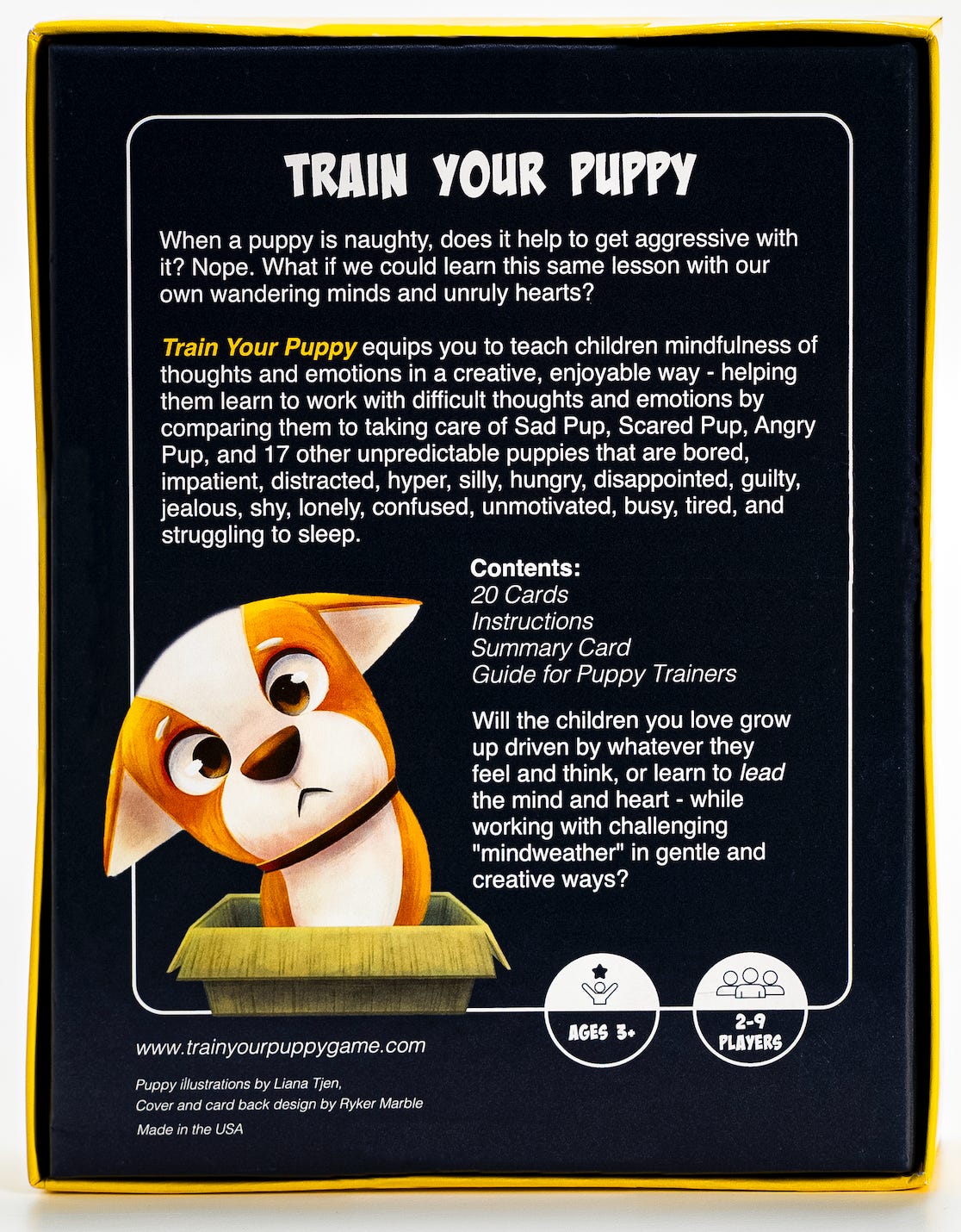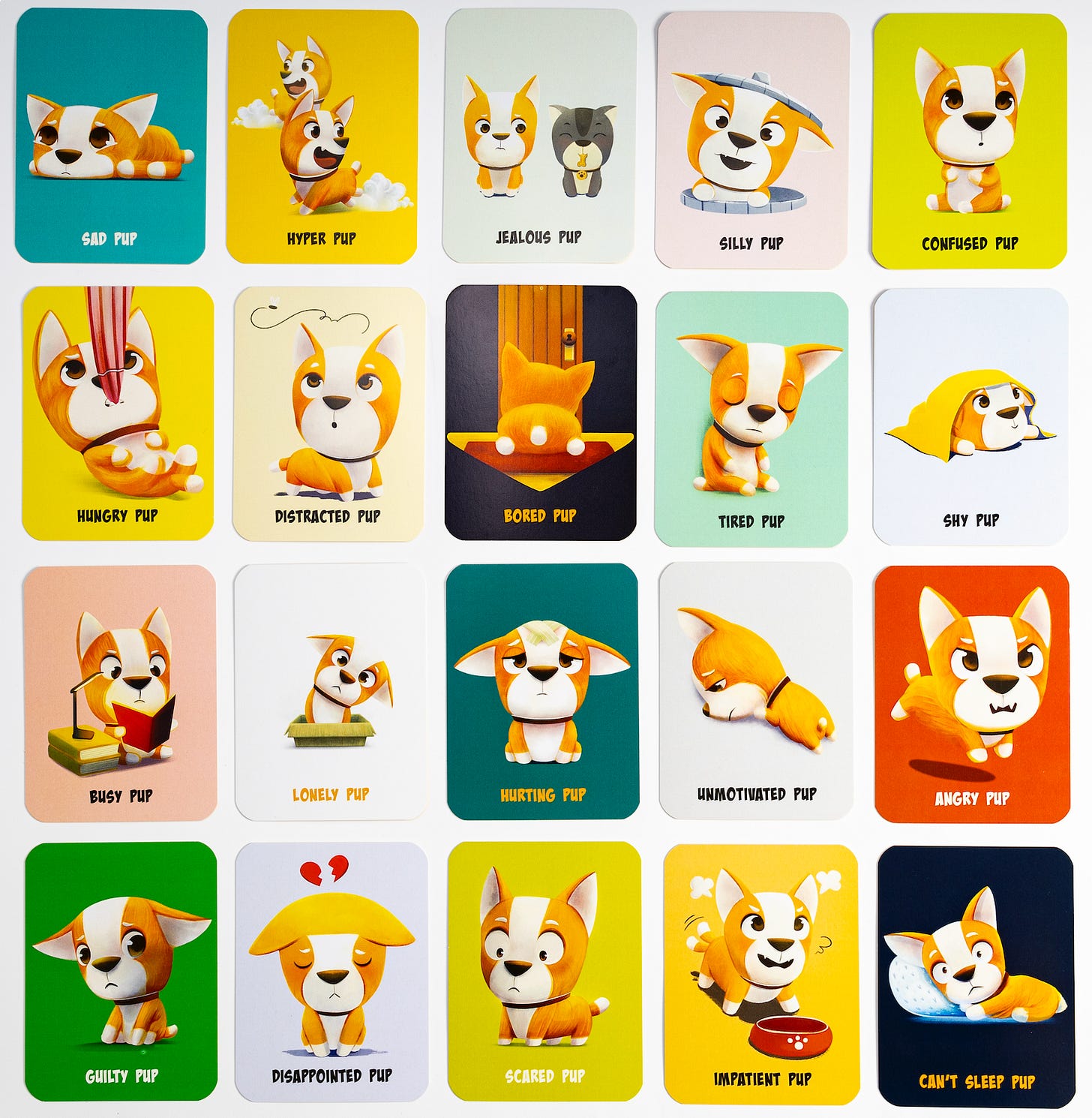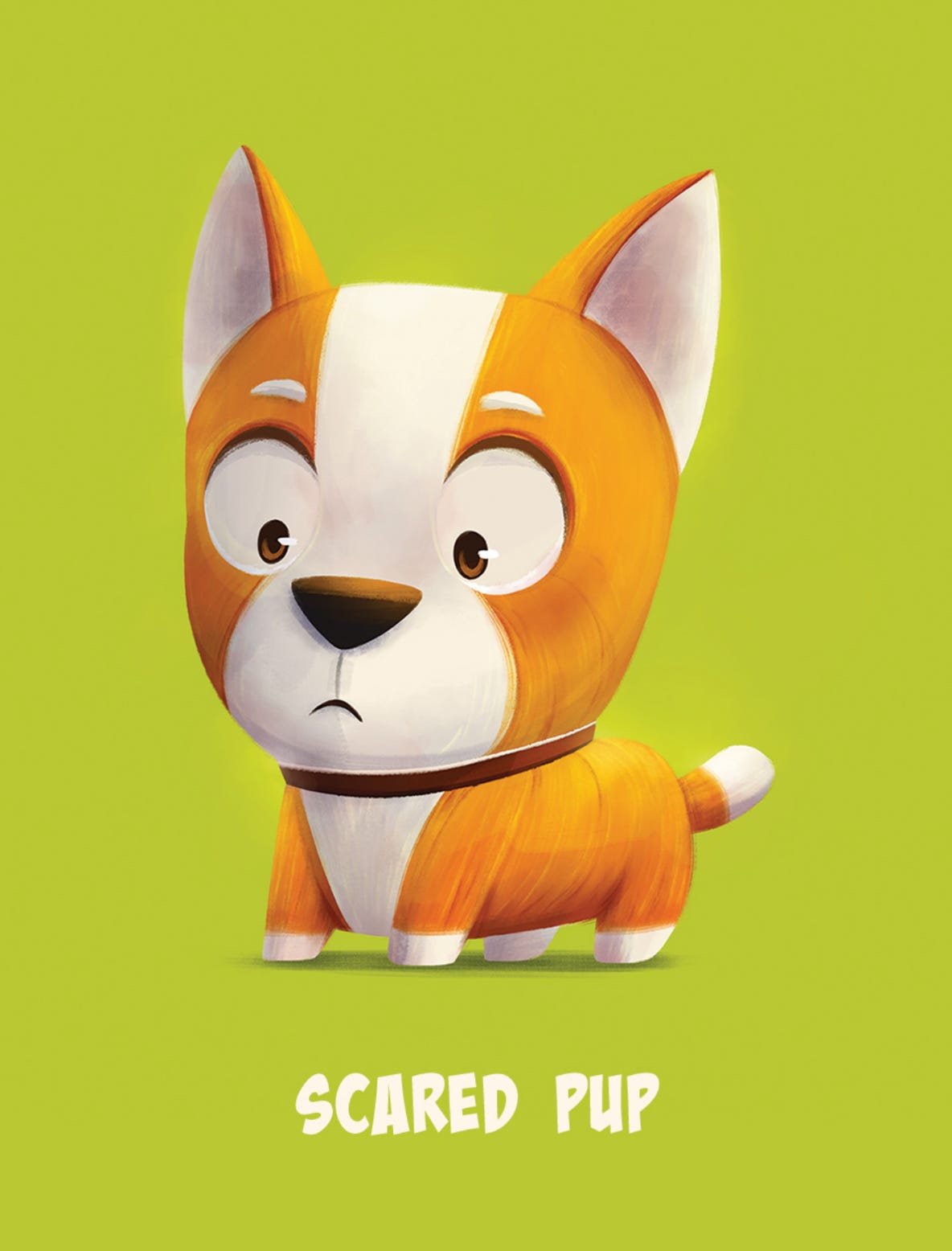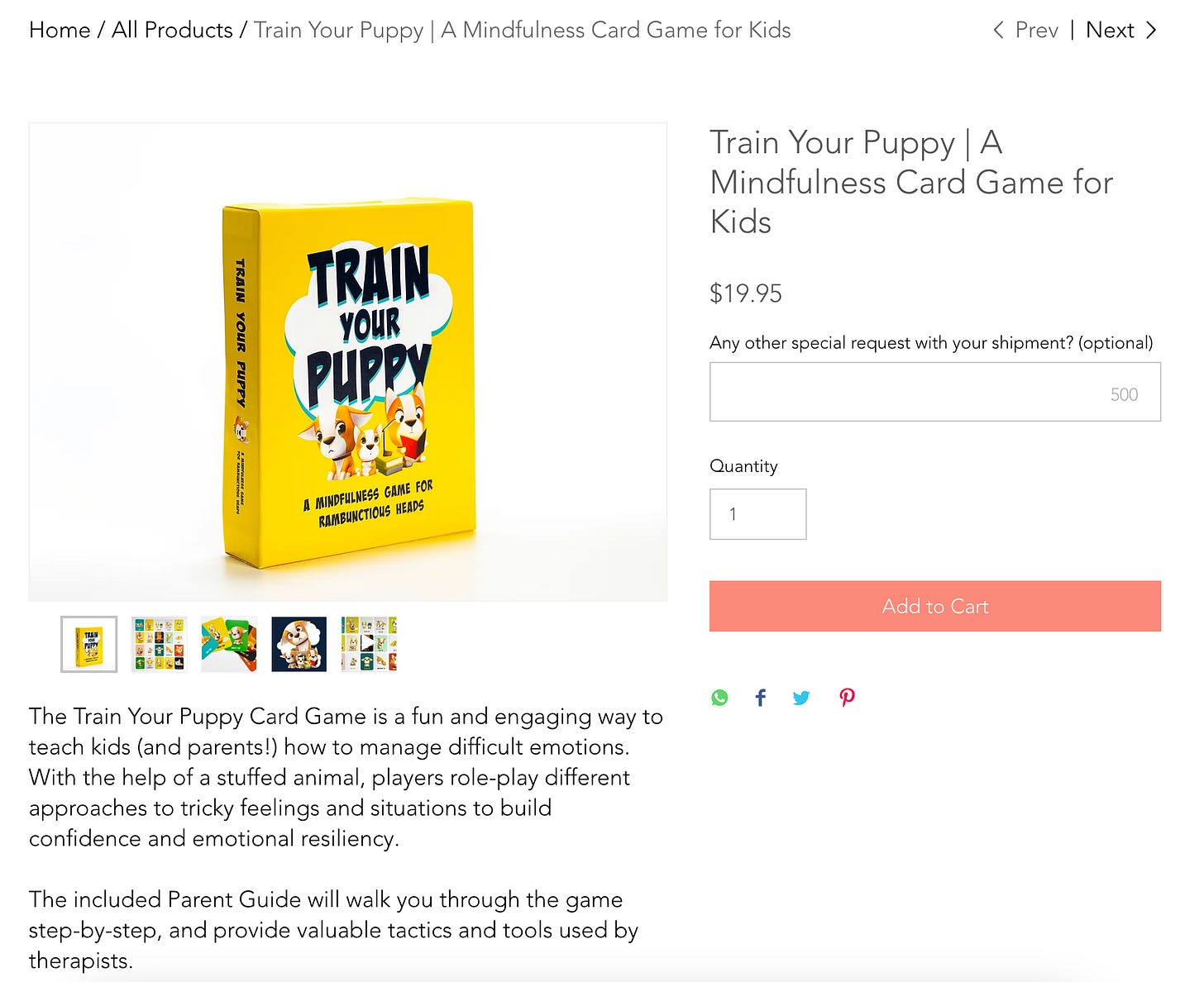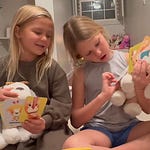Jump down to the bottom to see two ways to order Train Your Puppy! If you have any problems doing so, will you let me know? Below, I recap what inspired the game, how it’s played, and what we hope families will take away from it.
https://www.trainyourpuppygame.com/
Kim would get so worried about the scary thoughts she had as a 6-year-old girl that she could hardly go to school - all tied up in knots. Although Jason was hardly tall enough to reach my waist, his occasional outbursts would scare his friends and family, who were unsure how to guide him in a better direction.
I’ve heard many other similar stories over the years - kids so sad their parents are frightened, children so full of energy their teachers can hardly keep them in their seats. Many parents, grandparents, teachers and others supporting children are straining to find more answers.
In previous years, I’ve watched adults and teenagers learn to work through these same kinds of emotions as part of a “Mindfulness-based Stress Reduction” course developed by scholars at the University of Massachusetts - so remarkably successful in reducing chronic stress and chronic pain (1000+ studies and counting) that it’s now taught around the world (and even prescribed by some doctors).
But the question remains: how do you actually help children learn these same skills - and not be so driven, controlled and at the mercy of emotional flares?
That’s been a head-scratcher for many parents, including me and Monique, in raising our own rambunctious boys. And that’s what motivated me to develop this card game that doubles as a tool to teach children how to work through a wide spectrum of emotions they’re still getting used to dealing with in this crazy world.
It’s been a side-side project for a very long time - and was almost ready last Christmas. After getting a few last things polished this year on weekends, we couldn’t be more excited to share it with the world!
Kind of like a puppy
Even for adults, it can always feel a little abstract to learn how to work differently with thoughts and emotions. So, in our class we use metaphors: “These tumultuous thoughts are kind of like weather patterns overhead” or “a river passing by you” - which can help someone begin to imagine how they could respond differently (“oh, that means I can curl up in a blanket and watch the storm safely through the window - rather than only being the storm”).
For younger people, we like to say that thoughts are also like “a parade that we can step back from and watch from the sidewalk.” Or you can relate to them like “fireworks overhead.”
But you want to know what else our unruly thoughts and feelings are like? … a puppy!
Eastern cultures spoke anciently of the “wild mind” that needs to be trained - with the Buddha himself comparing the mind to a horse needing to be tamed. The entire Train Your Puppy game is centered around helping children (and maybe even the adults too, if they’re lucky), learn how to approach the mind this way.
How the game works
Everyone brings their favorite stuffed animal to the game (including the adults … so you better cut a deal with one of your children, grandchildren or students if you can’t find one from your own childhood).
With the deck shuffled and in the middle, participants turn over a card one at a time, starting with the youngest. If a child turns over “scared pup” they’re the first to answer: “What would you do for your stuffed animal if they felt scared like this puppy dog?”
The child tells everyone what she’d do (and you might want to encourage her to show what she’d do with her own stuffed animal). Then, everyone in the group adds what they would do too.
Here’s where the parent, grandparent, or teacher comes in. “So, you wouldn’t get angry at your puppy for being scared? You wouldn’t yell at it till it stops being scared?”
The children will all realize: obviously not … which sets you up for the important pivot in each round. “So, okay, what about when you’re feeling scared? What would you do?” Over and over, the game moves from puppy-to-person; as you talk and compare how you’d relate to an animal with your own mind, an important new lesson hopefully starts to distill for the children.
In the end, the person with the best ideas for how to work with puppies (and people) who are feeling scared gets voted as the “best trainer” for that emotion, and awarded the card. The person with the most cards in the end wins.
But hopefully everyone takes away something even better - a lesson they’re not going to hear many other places: “If there are so many gentle, patient, creative ways to help a puppy experiencing all these emotions, then what if we treated our own minds the same way?”
“How could that make a difference in our lives? Is it possible we could help our minds (and hearts) move in a better direction over time if we worked with them in this way?”
Needless to say, this isn’t how many people think about approaching swirling emotions inside these days. Even adults so often feel at the mercy of shifting mental and emotional patterns - driven and controlled, even tyrannized, by whatever happens to come up.
Mindfulness is all about stepping away from this kind of suffering, and finding enough breathing space to feel some emotional freedom. “Between stimulus and response there is a space,” Viktor Frankl taught. “In that space is our power to choose our response. In our response lies our growth and our freedom.”
This can take some practice to get down, and we’ve created a 41-page guide accompanying the game that we hope equips parents, grandparents, teachers and others supporting children to teach and model this - outlining a bunch of practical tips that should be helpful.
Although we hope this will be useful in other educational and therapeutic settings, we’re especially excited about trying to prepare parents and grandparents to teach their own children these things.
Our hope as a family
Our biggest hope is that this will be a blessing to other families grappling with hard emotional issues and their children. It will also be a blessing to us. Even with some really great support from family, friends and my good employer, this has been a difficult financial year for us - with quite a bit of health-related debt we still are facing. If we can sell all our Train Your Puppy inventory of 1000 games by the end of the year, we’ll be out of debt as a family completely!
I’m definitely no salesman, though. And apart from posting it on my substack and social media, I won’t have much time to promote and market this - perfectly happy as a full-time writer. So, if you would be willing to share this with another friend or family member with children, we’d really appreciate it. If you’ve got several friends or family members with children, and want to share this as a gift with all of them, we’ll send you as many as you need. (:
(Teenagers can be persuaded to play it as a family activity, by the way, so everyone in gets the lesson…)
Although we all like Amazon’s convenience, my brother-in-law has had painful experiences on Amazon as a small business. Even at their best, they take such a huge chunk. So we’re taking out the middle-man and selling it directly, in two secure ways:
Payment option #1
If you’re comfortable with Venmo, I’ve set up a business account that can take direct payment (@trainyourpuppy) If you send that along, and send your mailing address to drjacobzhess@gmail.com, we’ll get your game in the mail next weekend!
Payment option #2
Alternatively, you can also find directly on our website (www.trainyourpuppygame.com) an order form to input your mailing address and a secure payment processor that can take credit card or Paypal information.
If you order by next weekend, the orders should arrive by Christmas!
Two more things:
We’ve gotten used to free shipping on Amazon, but it would be challenging to absorb that cost for us. So if you’re willing to pay that 4-6 dollars for shipping, depending on where you live, along with dollar or so for sales tax, we would appreciate it. But if $27.50 feels like a lot for your holiday budget, send $20 and we’ll try to cover the rest. (For neighbors or coworkers, skip the shipping - and I’ll watch for you sometime before Christmas).
A HUGE thanks to Tim Hansen for formatting this lovely guide, Ryker Marble for the beautiful box and card back design, Mike Neeley and Utah PaperBox for the quality boxing, Liana Tjen for the adorable puppy illustrations, Jen Browning and Diana Gourley for thoughtful copyediting, Julia, Sara, Kalie and the Watkins Printing team for multi-year patience, Lauren Hess for the cute website and my son William Hess for amazing feedback (and his brothers Sam, Joseph, Joshua and my patient Monique for playing this over and over as we developed it till they were tired of puppies forever!)
Thanks to all - and to all a good night! (:




